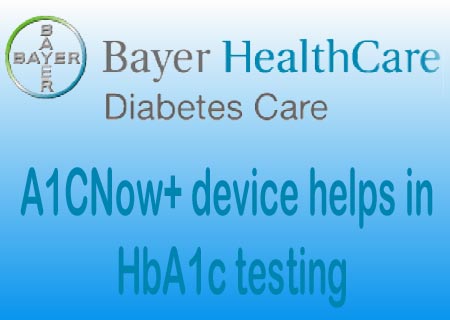Bayer Diabetes Care very proudly introduces its latest A1CNow+ device. This innovative device is used to measure A1C (HbA1c) or glycated hemoglobin, which is said to be a crucial marker for blood sugar level control over a period of long time.
It’s stated that the A1CNow+ is a hand-held, paper-sized, portable, meter-based device. This monitoring device can apparently be used for in-office A1C measurements. A1C is said to be the standard measure of overall blood sugar control accepted clinically. Apparently 5 uL of finger-stick blood and 5 minutes is all that is required to measure A1C with the A1CNow+ device.
This device is said to have disposable test cartridges. Healthcare providers can markedly in order to monitor A1C, use this device on diabetics as well. Unlike the lab analysis procedure of venous blood draws and further follow-up, the A1CNow+ permits finger-stick testing which evidently reveals the test results immediately.
“Bayer Diabetes Care is proud to be able to provide HealthCare Professionals in India a fast and easy way of getting A1C results in the office. Point-of-Care testing with the A1CNow+ lets the physician make on-the-spot treatment decisions, and discuss them with his/her diabetes patients face-to-face. This A1C monitoring system is just one of the ways Bayer Diabetes Care is helping to simply life with diabetes,†says Rakesh Julka, Country Division Head.
It’s estimated that around more than 40 million Indian people are presently diagnosed with diabetes. Apparently India has the highest diabetic prevalence in the world. It’s estimated that, in India, around 12 percent of its urban adults suffer from this disease, as compared to about 7 percent in the United States and the United Kingdom.
Apparently careless diabetic control may lead to various serious medical problems like stroke, cardiovascular diseases and kidney failure among others. Preceded by cataracts, diabetes is apparently said to be the most common cause of blindness in India. It seems that in a low-income Indian family, the treatment of one of the diabetic adult may perish around 25 percent of the family’s income.
Studies have evidently pointed out the benefits of early diagnosis of diabetes in people. They state that knowledge of one’s A1C level may aid in enhanced clinical-decision making and also in reducing one’s A1C levels. It’s estimated that with every one-point reduce in A1C levels there is an approximate 40 percent reduction in grave complications risk.

